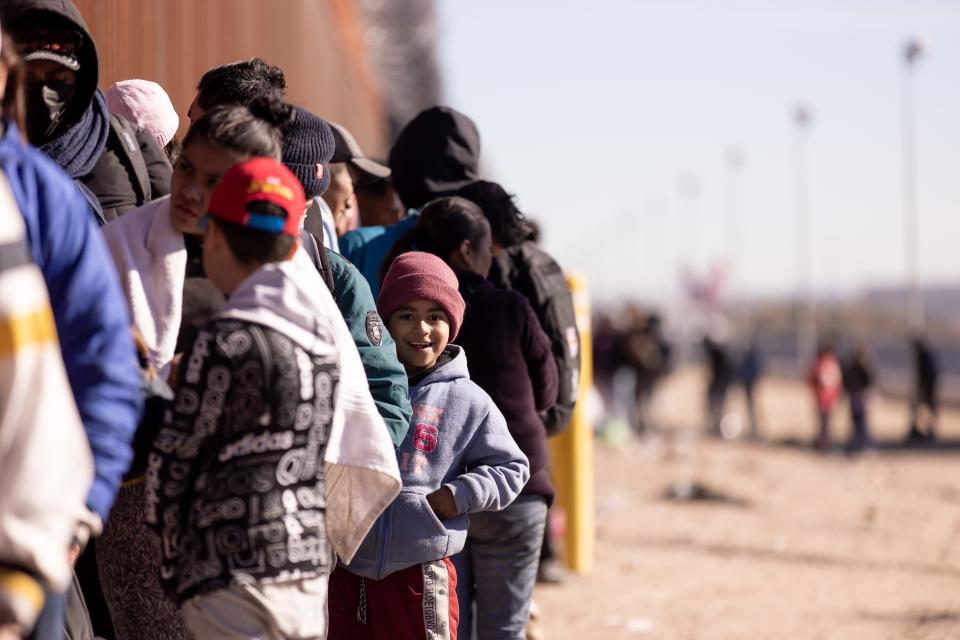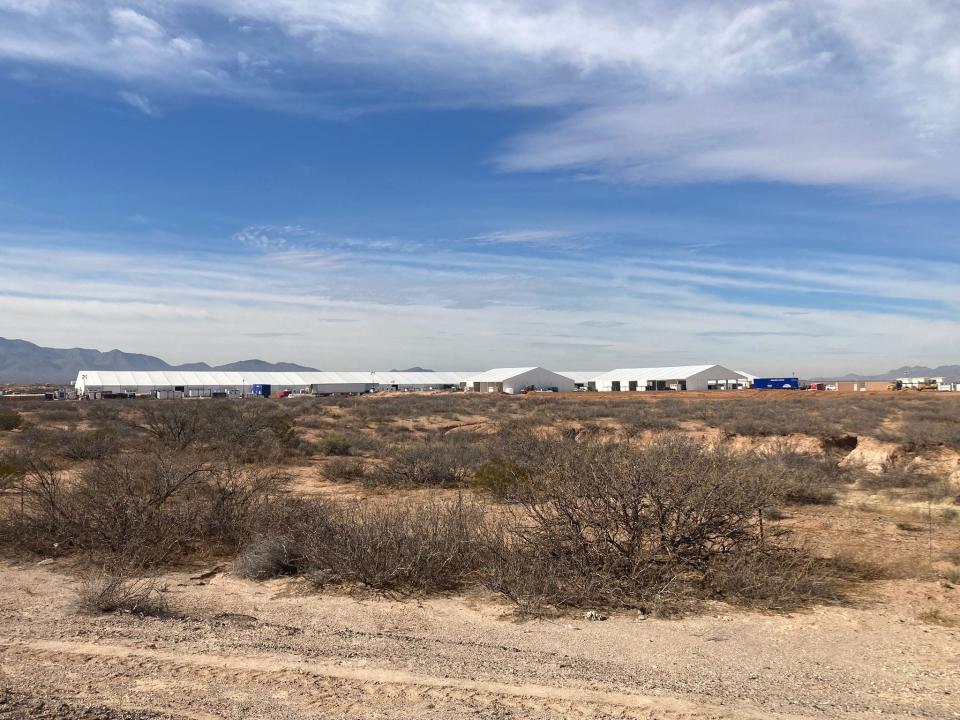US Supreme Court keeps Title 42 in place as temporary stay is extended
- Oops!Something went wrong.Please try again later.
- Oops!Something went wrong.Please try again later.
- Oops!Something went wrong.Please try again later.
In a highly anticipated ruling, the U.S. Supreme Court on Tuesday kept in place the immigration policy known as Title 42 despite the wishes of the Biden administration and to the delight of Republican immigration hard-liners both in Texas and across the country.
The ruling extends the Dec. 19 order by Chief Justice John Roberts, who halted what had been the expiration of the Trump-era policy last week.
"SCOTUS handed Texas and the USA a huge victory by allowing Title 42 to remain in place after Biden illegally tried to terminate this critical policy," tweeted Texas Attorney General Ken Paxton, who had joined his Republican counterparts in several other states in urging the justices in court filings not to allow the policy to expire.
"I will continue to fight at every turn and do everything in my power to help secure our border and keep Texans safe," Paxton added.
The high court's ruling calls for setting a date in February for a hearing before the full court in the case known as Arizona v. Mayorkas, a reference to Homeland Security Secretary Alejandro Mayorkas, whose agency oversees border security and immigration matters.
The ruling does not specifically address the merits of using Title 42 as an immigration tool since it was imposed as a means of limiting the spread of COVID-19 at the height of the pandemic.
In a dissent that was published with the ruling, Justice Neil Gorsuch questioned why the matter has been brought to the court at all.
"(T)he current border crisis is not a COVID crisis," Gorsuch wrote. "And courts should not be in the business of perpetuating administrative edicts designed for one emergency only because elected officials have failed to address a different emergency. We are a court of law, not policymakers of last resort."
Gorsuch's dissent was joined by Justice Ketanji Brown Jackson. Justices Sonia Sotomayor and Elena Kagan would have denied the request from the states in the legal action, the court's ruling noted.
White House press secretary Karine Jean-Pierre in a statement said the administration will abide by the court's ruling. And she echoed at least part of Gorsuch's dissent.
"Title 42 is a public health measure, not an immigration enforcement measure, and it should not be extended indefinitely," Jean-Pierre said. "To truly fix our broken immigration system, we need Congress to pass comprehensive immigration reform measures like the ones President Biden proposed on his first day in office."
Title 42 has been a flashpoint topic in Texas, which has the nation's longest border with Mexico. As its expected end last week drew near, border communities faced the prospect of a wave of immigrants seeking asylum and hoping to remain in the United States.
El Paso emerged as something of the epicenter, and Mayor Oscar Leeser reluctantly declared a seven-day state of emergency as the number of migrants in the community swelled and social services careened toward the breaking point.
More:El Paso extends emergency declaration as humanitarian border migrant crisis continues
The El Paso City Council on Friday extended the emergency declaration for at least 30 days as a means of maximizing services provided by government and charitable entities. Two members of the council called on President Joe Biden to visit the city and see firsthand what officials and relief agencies are facing.
Leeser has repeatedly asked for more federal support to provide shelter and transportation for migrants in anticipation of the end of Title 42. The Texas National Guard responded by staging concertina wire and shipping containers in El Paso to prevent migrants from approaching the border.
The El Paso Times contacted the mayor’s office for comment on Tuesday’s Supreme Court ruling, but none was received by deadline.
U.S. Rep. Veronica Escobar, D-El Paso, joined the chorus calling for a comprehensive fix on immigration and border security.
"Title 42 has been used ‒ for years now ‒ as a substitute for the badly needed reform to our broken immigration policy," she said in a tweet.
Faith-based and nonprofit organizations in El Paso have worked through the holiday season to shelter, feed and clothe the migrants arriving to the border city. On Tuesday, some criticized the ruling on Title 42.
"The decision of SCOTUS will extend the bottleneck at the border, create unsustainable pressure on border enforcement and lead to more deaths. Title 42 leads to an increase in irregular crossings and incentivizes smugglers and traffickers," said Dylan Corbett, executive director of the Hope Border Institute in El Paso. "Last year was the highest on record for border deaths. It’s an unsustainable and deadly policy."
On Twitter, Corbett was even more blunt.
“The SCOTUS decision to punt on #Title 42 is plain wrong. Title 42 is an enabler: an illegal use of a public health tool for the administration and Congress to punt on real reform at the border,” he said in a post.
The Las Americas Immigrant Advocacy Center, also based in El Paso, posted on Twitter that the ruling was “unfounded” and that Title 42 is “inhumane, dangerous, unnecessary, and long overdue to be rescinded.”
The prospect of ending the policy has roiled both the political and legal landscapes for months. In mid-November, a federal judge in Washington blocked the Biden administration from continuing the program, calling it "arbitrary and capricious." Before that, a different federal judge ruled that the administration could not end the program.

Then on Dec. 19, Roberts ordered a temporary halt to plans to end Title 42 to give the full Supreme Court time to consider the matter.
The Border Patrol has erected a massive white tent north of El Paso to house the expected influx of asylum-seekers. The federal agency could not provide details about the structure, but last week Jean-Pierre, the White House press secretary, confirmed plans by the Department of Homeland Security to deploy more resources to the border, in terms of personnel, along with humanitarian and enforcement support.
"DHS has also put in place technologies like linear ground detection systems and automated surveillance towers, and is increasing security at ports of entry," Jean-Pierre told reporters during a news briefing. "They’re also adding 10 soft-sided CBP holding facilities."

More:What is Title 42, when does it end, how does it impact US-Mexico border? Here's what to know
In statement released on Christmas Eve, Homeland Security pushed back on suggestions that immigration officials were lax on border security.
"There are 23,000 agents and officers working to secure the Southwest border and the United States Government continues to work closely with our partners in Mexico to reinforce coordinated enforcement operations to target human smuggling organizations and bring them to justice," the statement said. "That collaboration includes migration checkpoints, additional resources and personnel, joint targeting of human smuggling organizations, and expanded information sharing related to transit nodes, hotels, stash houses, and staging locations."
Under the Trump administration, the Centers for Disease Control and Prevention invoked the Title 42 public health law to prevent border agencies from holding migrants in "congregant settings," like cells, where COVID-19 could spread rapidly.
The policy allowed the Border Patrol to quickly expel migrants to Mexico or their country of origin.
Across the Southwest border, the Border Patrol expelled migrants more than 2.4 million times over the life of the policy, which began in March 2020 at the onset of the pandemic. The agency reported 370,000 expulsions in the El Paso Sector alone.
The controversy around the use of Title 42 for immigration control grew as the COVID-19 pandemic ebbed and vaccinations became widely available in the U.S.
The quick expulsions to Mexico had the unintended effect of encouraging repeat crossings, as criminal prosecutions for illegal entry were largely superseded. But so, too, was the U.S. asylum system. Both the Trump and Biden administrations subjected migrants to Title 42 expulsion, including those who tried to enter illegally and those who turned themselves in to border agents to seek asylum.
USA TODAY Network reporter Ryan Autullo of the Austin American-Statesman contributed to this report.
This article originally appeared on El Paso Times: Supreme Court keeps Title 42 in place as legal battle goes on

